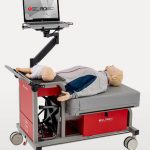CPR is a critical lifesaving skill for healthcare professionals, particularly nurses. Given the high incidence of in-hospital cardiac arrests — about 292,000 in the U.S. each year — ensuring nursing students achieve CPR competency is vital.
However, traditional CPR training methods often fail to provide sufficient practice and feedback. Innovative approaches to CPR training like the Resuscitation Quality Improvement® (RQI®) Program can improve skill retention and enhance performance. In fact, a recent study in the International Journal of Nursing Education Scholarship showed the effectiveness of RQI technology in developing and maintaining CPR competency among nursing students.
Challenges of Traditional CPR Training for Nursing Students
High-quality CPR is a critical skill for saving lives, yet the ability to perform it deteriorates quickly without regular practice. Educators have long struggled to ensure nursing students attain and maintain CPR competency.
"While many schools of nursing require students to be certified in basic life support on admission to the school or prior to clinical practice, rarely do students ever use or practice those skills to retain them," said Marilyn H. Oermann, a nursing professor at Duke University.
Traditional training methods also often involve infrequent, lengthy sessions that don't provide adequate practice opportunities. "Finding time within the curriculum for consistent practice is a significant challenge," Oermann added.
The RQI Program's Approach to CPR Training
The RQI Program addresses traditional CPR training challenges by offering low-dose, high-frequency training. Students can practice in short 10-minute sessions, receiving immediate feedback on their performance to help improve their skills and confidence. The ability to practice independently without faculty oversight also makes it easier for students to integrate training into their busy schedules.
A Study to Evaluate the Effectiveness of RQI
The study in the International Journal of Nursing Education Scholarship evaluated the impact of RQI technology on nursing students' CPR skills. It aimed to determine whether frequent, short training sessions using RQI simulation stations could enhance and sustain high-quality CPR performance compared to traditional training methods.
Methodology
The study involved 2,193 nursing students from 12 different schools, with 79% of participants having some level of prior CPR training. They underwent baseline assessments to gauge their initial CPR skills without feedback.
The students then participated in RQI sessions, which provided real-time feedback on their performance. The researchers tracked improvements in CPR skills across four key areas: adult compressions, infant compressions, adult ventilation and infant ventilation. They monitored participants' performance over multiple quarters to assess skill retention.
RQI Helped Nursing Students Gain High-Quality CPR Skills
Though most students were certified in basic life support, their median scores were below the passing threshold of 75%. Specifically, scores for adult compressions were 67%, infant compressions 46%, adult ventilation 65% and infant ventilation 57%.
Students improved their CPR skills after one session with an RQI Simulation Station. Adult compressions improved by 40%, infant compressions by 107%, adult ventilation by 51% and infant ventilation by 68%. These findings highlight the immediate benefits of real-time feedback in enhancing CPR performance.
RQI Helped Prevent Skills Decay
Continued practice using RQI technology helped participants retain their CPR skills. The percentage of students performing successful compressions and ventilations on their first attempt increased with each quarter they were in the program. This demonstrates the effectiveness of low-dose, high-frequency training in maintaining CPR competency over time.
Regular practice with RQI Simulation Stations also prevented the typical loss of CPR skills that occurs with infrequent practice. This is crucial for nursing students who may not have frequent opportunities to perform CPR in real-life scenarios.
How RQI Can Impact Nursing Practice
The study's findings show that RQI technology can help nursing students graduate with strong CPR competency. Given the nursing shortages and the high demand for proficient healthcare providers, having nursing students enter the workforce with strong CPR skills is crucial. This is especially important in acute care settings where new graduates may quickly find themselves in situations requiring immediate CPR intervention.
Ensuring Nursing Students Graduate Prepared
Nursing students can greatly benefit from the RQI Program. The low-dose, high-frequency approach with real-time feedback enhances students' CPR competency and confidence.
"The cost of RQI technology may be a challenge for some schools, but the technology and costs could be shared with a healthcare system, providing a mechanism for staff to engage in practice as well," Oermann explained.
By adopting the RQI Program, nursing schools can overcome traditional training challenges, ensuring students develop and retain the skills to consistently perform high-quality CPR. This shift in training methodology is essential for preparing the next generation of nurses to meet healthcare demands and improve patient outcomes.
Marilyn H. Oermann, PhD, RN, ANEF, FAAN is Thelma M. Ingles Professor of Nursing at Duke University School of Nursing. Dr. Oermann’s scholarship focuses on nursing education, with an emphasis on studies of the nursing literature. Her current research is on predatory publishing in nursing. Dr. Oermann is the author or co-author of 34 books (many of which have won national awards), more than 220 articles in peer-reviewed journals, and a wide variety of other publications.
In addition, she edited 6 volumes of the Annual Review of Nursing Education. Dr. Oermann is the Editor-in-Chief of Nurse Educator. She is past editor of the Journal of Nursing Care Quality and Nurse Author & Editor. She lectures widely on writing for publication and nursing education topics.
Dr. Oermann is a member of the American Academy of Nursing and National League for Nursing (NLN) Academy of Nursing Education. She received the NLN Award for Excellence in Nursing Education Research, the Sigma Theta Tau International Elizabeth Russell Belford Award for Excellence in Education, the American Association of Colleges of Nursing Scholarship of Teaching and Learning Excellence Award, the Margaret Comerford Freda Award for Editorial Leadership in Nursing from the International Academy of Nursing Editors, and the NLN President's Award.
In 2023, the National League for Nursing named a new award in her honor: the NLN Marilyn H. Oermann Award for Distinguished Research in Nursing Education, to recognize an individual or team that has generated an evidentiary base for the science of nursing education.

Marilyn H. Oermann, PhD,
RN, ANEF, FAAN
Thelma M. Ingles Professor of Nursing
Duke University School of Nursing









